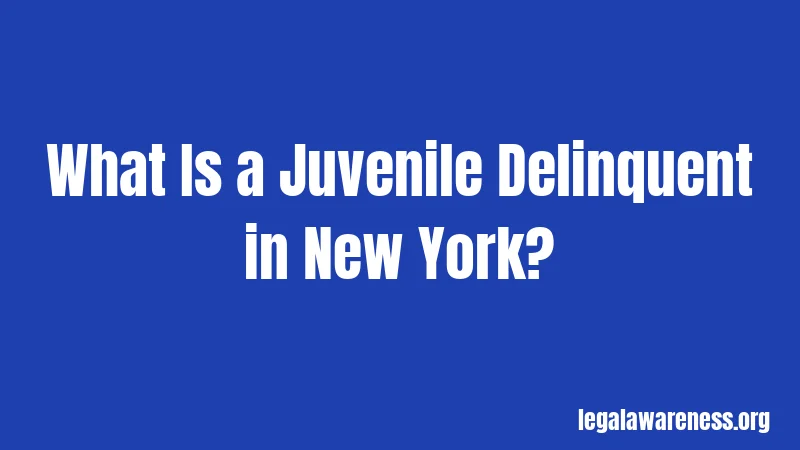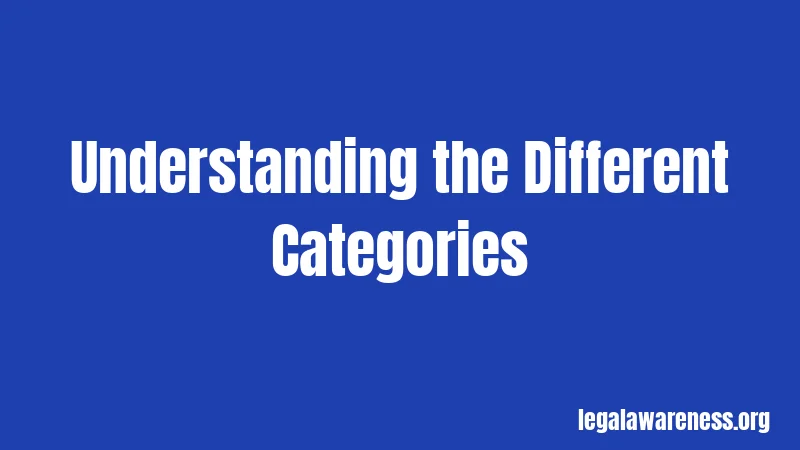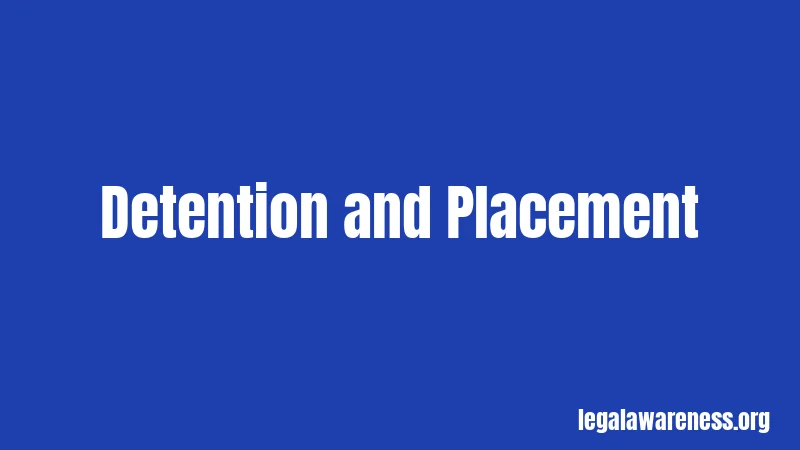New York Juvenile Laws in 2026: Understanding Charges and Court Process
Most people don’t realize how different juvenile laws work in New York. Seriously. If your kid gets arrested, they’re not treated like an adult. The system is totally different. Here’s what you absolutely need to know about how young people interact with the law in New York.
The juvenile justice system focuses on helping kids, not just punishing them. The goal is rehabilitation—getting young people back on track. Stay with me here. Understanding these laws could literally change how you handle a legal situation.
What Is a Juvenile Delinquent in New York?

A juvenile delinquent is a young person between 7 and 15 years old who commits an act that would be a crime if an adult did it. That’s the basic definition.
Here’s what makes this important: these kids aren’t treated as criminals. The court system is designed to help them. Their cases stay private. Their records can even be sealed later. Think of it like a traffic ticket compared to a criminal record—totally different outcomes.
Basic Juvenile Laws in New York
Who Gets Charged as a Juvenile Delinquent?
Kids under 12 years old? They can’t be arrested or prosecuted in New York. Zero. This changed in 2023 when Governor Hochul signed a law raising the minimum age. That was a huge shift.
Kids ages 12 to 15 are typically charged as juvenile delinquents. They go through Family Court, not criminal court. That means a judge, not a jury, hears their case. No bail gets set.
Kids ages 16 and 17 are usually treated as juveniles too now. Before 2019, New York treated 16-year-olds like adults. That changed. The state realized it wasn’t working. These older kids now get a chance at rehabilitation instead of a criminal record.
What About Serious Crimes?
Here’s where things get serious. Kids ages 13, 14, and 15 can be charged as “juvenile offenders” if they commit very serious crimes. We’re talking murder, rape, kidnapping, arson. These cases start in the Youth Part of criminal court.
But wait, even then they don’t get a full adult record. They’re still classified as juvenile offenders, which is different. The protections are a bit stronger than full adult status. Still confusing? Let me break it down.
Not sure what counts as a “serious crime”? The law lists specific felonies. Murder in the second degree, rape in the first degree, kidnapping, aggravated sexual abuse—these are the biggies that trigger juvenile offender status.
Understanding the Different Categories

Juvenile Delinquents (Ages 7-15)
Juvenile delinquents are kids who commit regular crimes but are handled gently by the system. Their cases go through Family Court. A judge focuses on what they need—counseling, treatment, supervision. The court doesn’t jail them in adult facilities.
The court can order probation. It can order them into programs. It can place them in juvenile detention facilities. But the goal isn’t punishment. It’s getting them to make better choices.
Here’s something most people don’t know: juvenile delinquency cases are confidential. They don’t show up on job applications. They don’t follow you into adulthood. The case can be sealed. Pretty different from an adult criminal record, right?
Adolescent Offenders (Ages 16-17)
Adolescent offenders are 16 or 17-year-olds charged with felonies. Their cases start in the Youth Part of Supreme Court. But here’s the key: many of these cases get transferred to Family Court.
If transferred, they’re considered juvenile delinquents and get the benefits of Family Court. That’s much better for them. The judge has discretion to move the case.
Adolescent offenders face stiffer penalties than younger kids. But they’re still not treated completely like adults. There’s some protection built in.
Juvenile Offenders (Ages 13-15)
Juvenile offenders are 13, 14, or 15-year-olds charged with very serious felonies. These cases are handled differently. They start in the Youth Part of criminal court.
Juvenile offenders receive reduced sentences compared to adults. But they can still receive significant penalties. If convicted, they have a criminal record—but not a “full” adult record. The difference matters for their future. A lot.
Okay, pause. Read this carefully. Recent legislation in 2025 might expand which crimes qualify for juvenile offender status. Sex offense cases are being debated. This area is changing, so check with a lawyer for the latest rules.
Penalties and Consequences
What Happens in Family Court?
In Family Court, the judge isn’t trying to lock kids up forever. They’re trying to rehabilitate. The judge can order:
Probation with supervision from the court system. Community-based programs and treatment. Placement in a juvenile detention facility (secure or non-secure). Or just release the kid with conditions.
Detention in Family Court is temporary—not a long prison sentence. The system believes kids can change. Most do when given support.
What Happens for Juvenile Offenders?
Juvenile offenders face stricter consequences. For murder in the second degree, the minimum prison time is 5 to 9 years. The maximum is life. That’s serious.
For other serious felonies like arson or kidnapping, 4 to 6 years is the minimum. Up to 15 years could be the maximum. Still substantial.
Class B felonies: minimum 1 year, maximum 10 years. Class C felonies: maximum 7 years. Class D felonies: maximum 4 years.
These sentences are less than adults get. But they’re real prison time. Kids go to facilities run by the Office of Children and Family Services (OCFS), not adult prisons.
Youthful Offender Status
Here’s where it gets interesting. Even if convicted, a young person might get “youthful offender status.” This seals the criminal record. It’s like the conviction gets erased from view.
Not everyone qualifies. Violent crimes, sex offenses, and certain serious felonies exclude you. But for many crimes, the judge has discretion to grant youthful offender status. That’s huge.
Recent 2025 legislation proposed expanding youthful offender status to cover more situations. Judges would have broader discretion. This could let more young people get their records sealed. These bills are still being debated, so the law might change.
Detention and Placement

Where Do Kids Go?
Young people charged as juvenile delinquents never go to adult jails. That’s a hard rule. They go to juvenile detention facilities operated by the Administration for Children’s Services (ACS) in New York City, or the Office of Children and Family Services (OCFS) upstate.
Facilities can be “non-secure” (more like a supervised living situation) or “secure” (locked in, stricter). The judge decides based on how serious the charges are.
Adolescent offenders go to specialized secure juvenile detention centers for older youth. These are separate from facilities holding younger kids. The state made these distinctions to keep kids safe.
If a case transfers to Family Court, placement stays in the juvenile system. You won’t find a 16 or 17-year-old in an adult jail in New York. Not happening.
Time Served
Time spent in detention or placement gets credited toward sentences. It counts just like adult jail time would. So time isn’t “wasted”—it applies to the overall punishment.
Kids in OCFS facilities can participate in educational programs. Some get trade training. The idea is keeping them productive while they serve their time.
The Court Process
What Happens After an Arrest?
When a young person is arrested, parents are notified. The child goes to court quickly—usually the next day or same day if arrested late.
For juvenile delinquents, this happens in Family Court. There’s a preliminary hearing. The judge decides whether to release the child to parents or detain them pending trial. No bail gets set.
For juvenile offenders and adolescent offenders, they’re arraigned in the Youth Part of criminal court. The process is similar, but the court is different.
The Fact-Finding Hearing
A “fact-finding hearing” is basically a trial. It happens in Family Court. A judge (not a jury) listens to evidence. The prosecutor has to prove guilt beyond a reasonable doubt.
It works like a regular trial. Witnesses testify. Evidence is presented. The judge makes a decision.
If the judge decides the child committed the crime, a dispositional hearing gets scheduled. That’s where the judge decides punishment.
If found not guilty? Case ends. The child goes home.
The Dispositional Hearing
This hearing is unique to juvenile court. The judge decides what the child needs. Probation? Program participation? Detention? Placement in a facility?
The judge gets reports from probation officers. They hear from social workers. They consider the child’s background, family situation, and needs.
This isn’t just about punishment. It’s about figuring out how to help the kid succeed.
Recent Legal Changes in 2025
New York is actively debating several juvenile justice reforms. These are important to know about.
Youthful Offender Expansion
One major bill would expand eligibility for youthful offender status. It would let judges grant youthful offender status to more young people, including some currently excluded. Specifically, it might expand options for youth convicted of certain sex offenses.
This isn’t final law yet. It’s still being debated. But if passed, many more young people could get their records sealed. That’s meaningful for their futures.
Juvenile Offender Second Chance Act
Another 2025 bill proposes giving first-time juvenile offenders a “second chance.” People convicted as juvenile offenders could later petition the court for youthful offender status. They’d need to meet criteria (clean record after conviction, no new felonies). If granted, they get record sealing.
Again, these are proposals. Check back for updates. But the trend is clear: New York wants to give young people pathways to redemption.
Detention Facility Changes
One bill addresses detention facility conditions. It prohibits housing minors with adults. This applies to New York City specifically. The goal is keeping youth safe from adult inmates.
Another proposal allows older youth (18-21) to be placed in specialized facilities instead of full adult prisons. It’s about age-appropriate detention.
These changes reflect a shift: New York is moving toward treating young people younger.
What About Criminal Records?
Family Court Records Are Private
If a case stays in Family Court, the record is sealed. Family Court proceedings are confidential. The public doesn’t see it.
The child doesn’t have a “criminal record” in the traditional sense. Employers don’t find it. Schools don’t find it.
However, the court system has access internally. Law enforcement can see it. This matters if the child is arrested again.
Juvenile Offender Records
If charged as a juvenile offender, the child faces a criminal record unless youthful offender status is granted. With youthful offender status, the record gets sealed.
Without youthful offender status, the record stays. It’s not an adult record, but it’s still there.
This is why youthful offender status matters so much. It’s the difference between a sealed record and a permanent one.
How Parents Can Help
Get a Lawyer Immediately
If your child is arrested, get a lawyer. The first thing you do. Don’t wait. Don’t assume it’s minor.
If you can’t afford one, the court assigns one free. But get legal representation before any questioning. This protects your child.
A lawyer familiar with juvenile justice makes a huge difference. They understand the system. They know the judges. They can negotiate.
Know Your Rights
You have the right to be notified of your child’s arrest. Police must tell you. Your child can’t be questioned at length without a break. Questioning must happen in an appropriate place, not a regular police station holding area.
Your child has Miranda rights. They can refuse to answer questions. Having a lawyer there is crucial.
Stay Involved
Attend court hearings. Get reports from probation officers. Understand what programs your child needs.
The judge considers family involvement. Showing up, caring, being part of the solution—judges notice. It affects outcomes.
Special Circumstances and Exceptions
Transfer to Adult Court
In rare cases, a juvenile delinquent case might be transferred to adult court. This is the opposite direction. Usually it doesn’t happen.
For juvenile offenders and adolescent offenders, cases sometimes transfer to Family Court. That’s actually good—it means they’re treated more leniently.
Judges have discretion. They consider the crime’s severity, the child’s age, prior record, and whether family court can handle the case.
Serious Crimes
Some crimes are so serious that juvenile protections matter less. Murder cases still get reduced juvenile sentences. But the consequences are substantial.
Sex offenses: The law is evolving here. Traditionally, certain sex offense cases gave juvenile offender status even for young teens. Recent proposals might expand this. It’s a debated area.
Crimes against parents: These get treated seriously. Assaulting a parent bumps a case up in severity. Judges take these cases seriously because family violence is taken seriously.
Getting Records Sealed
After serving your sentence, records can be sealed. For Family Court cases, they’re already confidential. But they can become officially sealed.
Criminal convictions can be sealed if you’ve been crime-free for 10 years. Sex offenses, violent felonies, and certain serious crimes typically can’t be sealed.
Youthful offender cases get sealed automatically when the youthful offender finding is made. That’s the benefit of that status.
Frequently Asked Questions
Can a child under 12 be arrested in New York?
No. New York raised the minimum age to 12 in 2023. Kids under 12 can’t be arrested or prosecuted for crimes, with extremely limited exceptions (like homicide).
What’s the difference between a juvenile delinquent and a juvenile offender?
Juvenile delinquents are typically younger or charged with less serious crimes. Their cases go through Family Court. Juvenile offenders are ages 13-15 charged with serious felonies. Their cases start in criminal court and face stricter sentences.
Will a juvenile conviction follow my child forever?
Not necessarily. Family Court records are sealed. Some juvenile offender records can be sealed with youthful offender status. Even without sealing, records have limitations. Many employers and educational institutions can’t see juvenile records.
Can my child go to adult jail?
No. No young person under 18 goes to adult facilities in New York. The law is explicit. They go to juvenile detention or placement facilities only. Those under 18 charged with felonies get held in specialized youth facilities.
What if my child is charged with a sex offense?
Sex offense cases are complex and evolving. Depending on age and offense severity, the case might go through Family Court or criminal court. Youthful offender status eligibility is currently debated in legislature. This is an area where legal representation is absolutely critical.
Final Thoughts
New York treats young people differently than adults. That’s intentional. The system believes kids can change with help.
Understanding these categories matters enormously. Juvenile delinquent? Different from juvenile offender. Adolescent offender? Another distinct path. Youthful offender status? That’s a game-changer.
If your child gets in legal trouble, don’t panic. But take it seriously. Get a lawyer. Understand the process. Work with the system.
The juvenile justice system isn’t perfect. But it exists to rehabilitate, not just punish. Use that to your advantage. Stay informed. Stay safe. And when in doubt, ask a lawyer.
References
Official New York Court Resources:
New York State Legislation:
- NY Penal Law Section 70.05 – Juvenile Offender Sentences
- NY Criminal Procedure Law Article 720 – Youthful Offender
- 2025 Youth Justice Bills – NY Senate Legislative Library
Government Agencies:
- NYC Administration for Children’s Services (ACS) – Juvenile Justice
- NY Office of Children and Family Services (OCFS)
Legal Information:
- Mayor’s Office of Criminal Justice – Raise the Age Fact Sheet
- New York State Defenders Association – Juvenile Defense
Current Legal Discussions:
